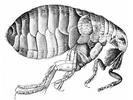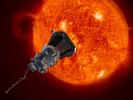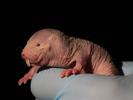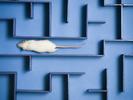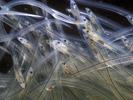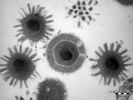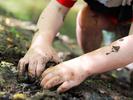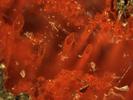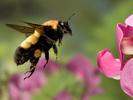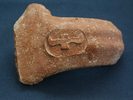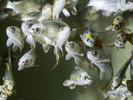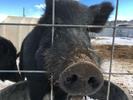Rae Ellen Bichell appears in the following:
To Solve Gruesome Desert Mysteries, Scientists Become Body Collectors
Saturday, July 01, 2017
People are dumping corpses in the high desert of western Colorado. But those unloading bodies aren't criminal masterminds. They're scientists. And out here, the usual rules of human decay don't apply.
The Plague Is Back, This Time In New Mexico
Thursday, June 29, 2017
In medieval times, they called it "the black death." It's still around, routinely cropping up in the U.S. This time, the New Mexico Department of Health reports three cases.
A Couple's Quest To Stop A Rare Disease Before It Takes One Of Them
Monday, June 19, 2017
Twenty years. That's how long two grad students, Sonia Vallabh and Eric Minikel, think they have before a deadly disease envelops Sonia's brain. The Massachusetts couple is now racing to find a cure.
A Mother's Early Death Drives Her Daughter To Find A Treatment
Monday, June 19, 2017
Sonia Vallabh knows that by the time she's middle-aged, a rare inherited disease will likely start killing off her brain cells. She and her husband have become scientists to try to stop the disease.
NASA Plans To Launch A Probe Next Year To 'Touch The Sun'
Wednesday, May 31, 2017
The small spacecraft is set to hurtle toward the sun at about 450,000 miles per hour. Scientists hope it will clear up some big mysteries, such as why the sun's atmosphere is hotter than its surface.
Researchers Find Yet Another Reason Why Naked Mole-Rats Are Just Weird
Thursday, April 20, 2017
The hairless, ground-dwelling, cold-blooded rodents have proven capable of surviving total oxygen deprivation. Their odd biology allows them to run on an alternative fuel.
Human Umbilical Cord Blood Helps Aging Mice Remember, Study Finds
Wednesday, April 19, 2017
Researchers found that a protein in human umbilical cord plasma improved learning and memory in older mice, but there's no indication it would work in people.
Eels May Use 'Magnetic Maps' As They Slither Across The Ocean
Thursday, April 13, 2017
Eels sometimes swim thousands of miles from their birthplace in the Atlantic to rivers and lakes where they live. Researchers say the creatures might use the Earth's magnetic field to find their way.
In Giant Virus Genes, Hints About Their Mysterious Origin
Thursday, April 06, 2017
They're the Godzillas of the virus world, pushing the limit of what is considered alive. Researchers are trying to figure out where they came from. (And no, they aren't known to make people sick.)
Childhood Exposure To Lead Can Blunt IQ For Decades, Study Suggests
Tuesday, March 28, 2017
Researchers following a group of New Zealanders over the course of 40 years found an association between childhood lead exposure and declines in intelligence and socioeconomic status later in life.
A Microbe Hunter Plies Her Trade In Space
Tuesday, March 14, 2017
Meet Kate Rubins, a virus-hunter turned astronaut. When she sequenced DNA in space for the first time, she opened the door to a new era in space biology.
Maybe You, Too, Could Become A Super Memorizer
Wednesday, March 08, 2017
After six weeks of training, people could memorize twice as much. Areas of the brain had begun communicating in new ways — a lot like what happens inside the heads of world memory champions.
WATCH: Raindrops Catapult Bacteria Into The Air, And It's Beautiful
Tuesday, March 07, 2017
They don't have wings, but bacteria sure can fly. Researchers at MIT say that tiny bubbles trapped by raindrops play a part in launching bacteria on long-distance flights.
The Culprit In Rising Western U.S. Smog Levels: Asia
Friday, March 03, 2017
U.S. emissions of smog-forming pollutants have dropped, but smog levels in the western U.S. have increased each year. Now, researchers say, they've found out why — it's wafting from across the Pacific Ocean.
Tiny Fossils Could Be Oldest Evidence Of Life On Earth
Wednesday, March 01, 2017
Scientists say they've found the remains of tube- and string-like organisms in Canadian rocks that are at least 3.7 billion years old. But findings like these are always controversial.
Could A Bumblebee Learn To Play Fetch? Probably
Friday, February 24, 2017
Scientists found that bumblebees are nimble learners, especially when there's a sugary reward at the end. No wonder they're such good pollinators.
Iron Age Potters Carefully Recorded Earth's Magnetic Field — By Accident
Tuesday, February 14, 2017
The planet's magnetic field is weakening. Scientists aren't sure why, but studying ancient jars could help them find out. The ceramics provide a remarkable window onto Earth's magnetic past.
In Studying Sick Fish, Scientists Trace History Of Fevers
Thursday, February 09, 2017
Carp are a major food source, but they've been plagued by viruses. Scientists now say they have a simple solution. And along the way, they hit on an ancient commonality between fish and people.
Scientists Get Down And Dirty With DNA To Track Wild Pigs
Tuesday, February 07, 2017
Wild hogs inflict $1.5 billion in damage on U.S. property each year. But biologists can now track the elusive animals via tiny bits of DNA the swine leave behind in puddles and ponds.
Prion Test For Rare, Fatal Brain Disease Helps Families Cope
Monday, February 06, 2017
Scientists now have a fairly noninvasive way to test for Creutzfeldt-Jakob disease, a rare form of dementia. A similar test, they say, might offer earlier diagnoses of Parkinson's and Alzheimer's.


